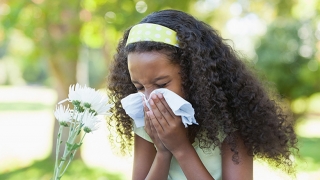Preparing for Pollen Season
Published on
Health Tip of the WeekPublished on
Health Tip of the Week If your child is affected by pollen allergies, you know the season of sneezing and itchy eyes has arrived for spring allergy sufferers. The waves of pollen start in early spring when trees begin to flower, continue through late spring and the hot summer months with grass pollen, and come back in the fall with ragweed.
If your child is affected by pollen allergies, you know the season of sneezing and itchy eyes has arrived for spring allergy sufferers. The waves of pollen start in early spring when trees begin to flower, continue through late spring and the hot summer months with grass pollen, and come back in the fall with ragweed.
Ashwini P. Reddy, MD, an allergy specialist with the Allergy Program at Children’s Hospital of Philadelphia (CHOP), offers suggestions for limiting your child’s exposure to pollen and managing uncomfortable allergy symptoms.
If you are considering allergy shots (allergy immunotherapy) for a child with pollen allergies, or oral allergy drops for grass allergy, the best time to start them is after the pollen season ends.
Allergy shots/drops begin with small doses of the substance that triggers the allergy, gradually building up to doses large enough to prevent allergic responses. This takes time, and it’s best to have the series of injections/drops when your child is not affected by airborne pollen.
Talk with your allergist to find out if allergy immunotherapy might help your child, and when would be the best time to start.
Contributed by: Ashwini P. Reddy, MD
Categories: Health Tip of the Week
Are you looking for advice to keep your child healthy and happy? Do you have questions about common childhood illnesses and injuries? Subscribe to our Health Tips newsletter to receive health and wellness tips from the pediatric experts at Children's Hospital of Philadelphia, straight to your inbox. Read some recent tips.